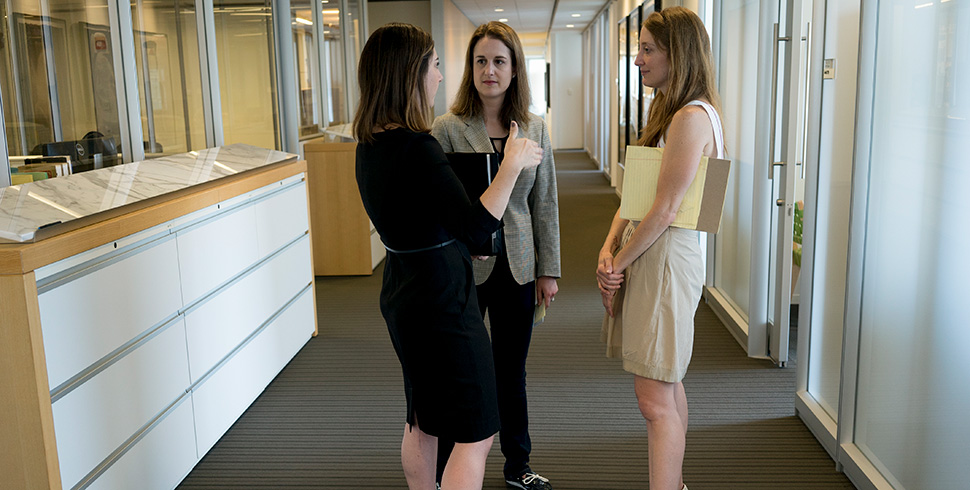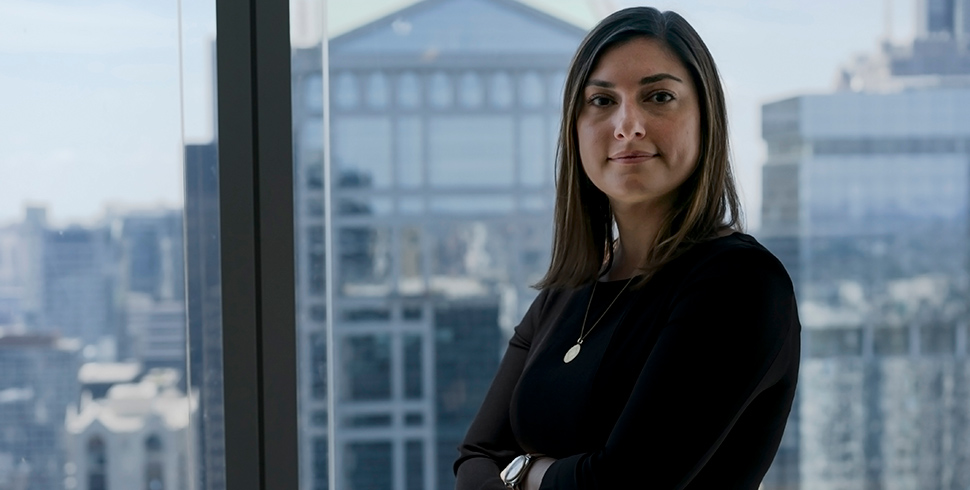Putting Her Skills Into Action
“We thought, we don’t know if they’re going to need us but what’s the harm? Get on the blue line, go to the airport and see.”
Leah Casto was getting ready for a Saturday night out with her husband when news broke that the president had issued an executive order banning travel from a handful of Muslim-majority countries. As a commercial litigation attorney at Jenner & Block, Leah didn’t specialize in immigration law, but as the granddaughter of immigrants, the thought of people being denied entrance to the United States based on where they were born pulled at her. “My family was able to do this. I want to reach out to you and give you that opportunity too.”
A train ride later, Leah found herself in the center of the protest at Chicago’s O’Hare International Airport, working with a group of attorneys to pull together legal filings on behalf of detained individuals. “There are so many ways that you can harness what you have and give back,” says Leah. Whatever issues are most important to you, “start at home or in your close community and see what other opportunities present themselves,” she advises.
If deported, Fiore would be imprisoned & killed. @NIJC + CFW helped her win asylum. Click To TweetSince the protest, Leah has remained involved in immigration issues, working alongside the National Immigrant Justice Center’s (NIJC) Gender Justice Initiative, to help women, children and LGBT people seeking asylum in the United States. CFW has funded the Gender Justice Initiative for nearly a decade, assisting immigrant women fleeing gender-based violence through legal representation and advocacy for legal protections for survivors. With CFW’s support, NIJC led national efforts to reauthorize the Violence Against Women Act and to protect immigrant women from abuse by the detention system.
When the National Immigrant Justice Center reached out to Leah’s firm about a group of Eritrean women being detained, Leah jumped at the opportunity. The UN Human Rights Council has declared Eritrea a “totalitarian state” based on gross human rights violations including forced labour and imprisonment, arbitrary arrest, torture and extrajudicial killings. Fiore, a twenty-three year old woman, was seeking asylum after her father was murdered and three of her siblings disappeared during mandatory military service.
The UN Human Rights Council declared Eritrea a “totalitarian state” based on gross human rights violations including forced labor and imprisonment, arbitrary arrest, torture and extrajudicial killings.
“Eritrea is a difficult place…but it is disproportionately difficult for women,” says Leah. Female genital mutilation is common practice, and women are often victims of sexual assault and abuse during mandatory military service. “Fiore was targeted because she was an unmarried, childless woman. She was sexually assaulted by an officer and she believes that if she had stayed in Eritrea, she would’ve been raped and assaulted, and conscripted to the military indefinitely.”
Without any identification, Fiore and her legal team had to prove that she was eligible for asylum in the U.S.
“I had sleepless nights,” admits Leah. “In my mind, it was life or death if Fiore did not get asylum. [If] she was deported to Eritrea, she would certainly be imprisoned and killed.”
“The relief and happiness I felt when the judge finally said, ‘I am granting you asylum, you’ll be released tomorrow’ cannot match any experience that I’ve had in my life,” says Leah.
Fiore is settling into life in Chicago. Although her asylum is secured, she still needs assistance securing housing, applying for school and jobs, and counseling to recover from the trauma she experienced. “I don’t think we’re doing service to women in Chicago if we’re not connecting these issues,” says Leah. “It’s great to have Chicago Foundation for Women to make sure that we’re all working together.”
Leah has stayed in touch with Fiore since her case ended, and regularly checks in on her. “The Fiore I met when I first connected with in April is not the same person that I see today,” says Leah. “You can just see this weight that’s been lifted off of her. I can’t wait to see where she goes next.”



